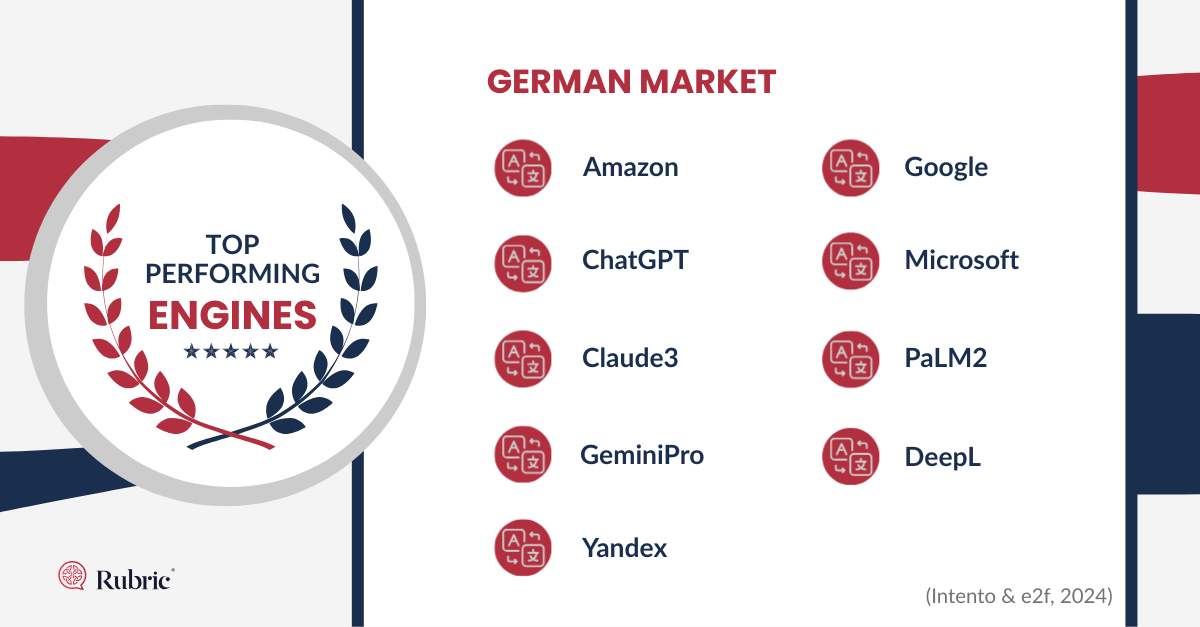
Are you a global company looking to expand your business into the German Market? If so, this is the guide for you!
Germany is a well-established and lucrative market with strong connections to the rest of Europe. Its population is used to buying from and selling to global companies and it has an impressive foothold in various industries.
In this market guide, we'll provide information and guidance on how you can successfully localize your content for the German market, and how our team at Rubric can help. With the right strategy, you can connect better with German audiences and maximize your sales.
Let's get started!
Market overview: What you need to know about Germany
Germany is located in central Europe, bordered by the North Sea and Baltic Sea. The capital city is Berlin, and the country has strong infrastructure links with the other European countries it borders — Austria and Switzerland in the south, France and Luxembourg in the west, and Poland and Czechia (diplomatically known as the Czech Republic) in the east.
Germany is an attractive market for global companies. It has a population of 83 million, the fourth largest economy in the world, and contributes almost 25% of the European Union's total GDP
Germany is a major exporter of industrial goods. Its major industries include vehicles, machinery, electronics, metals, and plastics. It is also the USA's most important trading partner within Europe.

Digital adoption in Germany: GDP and demographics
Digital adoption in Germany is strong and continues to rise. The market has a high internet penetration rate of 93.5%, so most people have easy access to online platforms. This number continues to grow year-over-year and is expected to reach 93% by 2027.
Social media penetration is also relatively high, at 77.6%, further showing the population's acceptance of digital platforms. People are also very willing to buy products and services online, and 83% of Germans buy something online at least once a year — this is an equivalent of 69 million potential eCommerce clients.
The market is also a strong economic prospect for online commerce. The German language contributes 7.1% of the world's online income opportunity. This makes it the 4th most lucrative language in the world, behind English, Simplified Chinese, and Spanish.
The German language also contributes to 2.5% of the total global online population but only has 28.4% support on international brand websites. This means there is a lot of untapped potential in the German market.
Finding it difficult to create a strategy for your digital content in the German market? At Rubric, we can do more than just help with your localization needs. As a translation partner, we can assist throughout your content processes, helping you refine your content strategies, advise on content authoring, pipeline optimization and more.
What languages are spoken in Germany?
Germany is both linguistically diverse and quite straightforward for localization.
The official language is German and over 95% of the population use Standard German or one of its dialects as their primary means for communication. This means that you can reliably localize your content for the market by translating into the German language.
There are also various other languages spoken within Germany to varying degrees. These include Romani, Danish, North and Saterland Frisian, and Upper and Lower Sorbian. There are also plenty of immigrant languages including Turkish, Kurdish, and Russian.
Germans tend to have a high level of English and many people are happy to converse in English. However, this isn't always true and you shouldn't rely on it.
Localizing your content into German is one of the best ways to ensure that consumers connect with your brand and clearly understand your content. At Rubric, we work with highly skilled linguists native to Germany, who can use their local expertise to ensure that your messaging resonates with German customers.
Artificial Intelligence (AI) Translations in the German Market
The German market has been receptive to the increased use of Artificial Intelligence (AI) in the translation industry. Increasingly, a range of different translation engines are being used to automate localization processes, often saving businesses money and time in the process. Although we often think of widely used engines like Google Translate, there are a huge range available, with different levels of maturity, and tailored to different markets. Many use a technology called neural Machine Technology (nMT), which allows them to “learn” from their past translations, and therefore improve in quality, much like a human linguist.
These are currently the top performing engines for German:
Amazon, ChatGPT, DeepL, Google, Microsoft, Yandex, Gemini Pro, Claude3, PaLM2

Germany is embracing AI innovation, and the government are investing in its development. AI is being used across a diverse range of sectors, such as to assist with medical translations in healthcare settings. Alongside this, exciting private sector support, such as Microsoft’s recent €3.3 billion investment into AI infrastructure, has been helping to expand the country’s capabilities when it comes to AI.
Looking to incorporate AI into your localization strategy for Germany, but not sure where to begin? Rubric has developed our Assured AI solution to help you navigate AI use with confidence. With Assured AI, you can save valuable time and money automating your localization process, without compromising on quality, as we always retain a human touch. Get in touch here to find out more and book a demo.
5 compelling benefits to doing business in Germany
There are many significant benefits that you can gain by growing your business into the German market.
Here are 5 compelling benefits to growing in Germany:
1. A strong economy means attractive returns
Germany is one of the largest and most stable economies in the world. Its strong GDP, high growth rate, and low unemployment make it an attractive destination for international investors.
This strong economy helps to ensure a secure business environment and reduces the risks associated with operating in more volatile economies.
2. Innovation leader helps develop your competitive edge
Germany is globally renowned for its investments in research and development. It ranks as the country with the third highest investment in innovation in the world.
This innovation culture can help your company to develop your competitive edge, giving you access to many more benefits than just new customers.
3. Global presence with international savvy
The presence of Germany on the world stage means that it is already well integrated into the global marketplace. People are used to buying and selling internationally, which reduces the barriers to entry.
As Europe's most important European market for foreign producers, your company can benefit from this worldwide network.
4. Lucrative consumer market with high spending capacity
As Europe's largest consumer market, the German population has a relatively high spending capacity and a strong culture of consumption.
Germany's affluent consumers are willing to buy internationally, allowing you to introduce higher-end products and services.
5. Forward-thinking culture with commitment to growth
The German government and population are committed to creating growth opportunities, both for local companies and international partners. The market's culture of innovation has led to tremendous success in various industries, particularly manufacturing.
This forward-thinking business culture creates an ideal environment for your company to grow operations in Germany.

Compliance and regulations in Germany you should know about
Germany has a strong regulatory culture. You need to be aware of the relevant regulations to ensure you are conducting business legally.
First, it's important to understand the legal framework that governs all activities in Germany. Under the German Civil Code, contracts must include detailed information on product properties, subscription details, cost breakdowns, price and shipping costs, and any other constraints or limitations.
As a global company, it's also a legal requirement to report any payments received from or made to an outside country that exceed EUR12,500. The German market also has many public holidays, so banks, merchants, and supermarkets all close on these days.
Finally, the Federal Ministry for Economic Affairs and Energy reserves the right to review, bar or limit certain types of transactions that do not conform with public order and security considerations.
Tariff Structure:
As a member of the EU, Germany operates under the EU Common Customs Tariff (CCT) to regulate trade between EU members
US-Germany Trade Relationship:
The US and EU have a significant trade relationship and the EU-US Trade and Technology Council (TTC) helps to coordinate trade and resolve trade issues
Future tariffs between the US and the EU are still unconfirmed, and the US could face future tariffs from the EU in response to President Trump’s new policies.
What is the political climate like in Germany?
The political climate in Germany is stable and highly conducive to global business. The nation's longstanding social market economy model has been a major factor in this. Germany is a safe place for citizens to live in, with personal rights and civil liberties being enshrined in the nation's constitution.
This stability is further complemented by Germany's strong legal security measures, highly trained labor force, and reliable infrastructure.
Recent years have seen Germany take decisive steps to improve its cybersecurity, making it a stable market for online activities.
The 5 keys to successful sales in Germany
In line with the global perception of German people, they tend to follow the rules and respect cultural norms and hierarchies in business.
Here are 5 keys to successful sales in Germany:
1. Stay direct and to the point
When dealing with German clients, it is important to keep communication direct and efficient. Germans prefer a straightforward approach with minimal fluff or distractions.
Sales and marketing content should be concise and focused only on the core points. Also, don't be afraid to say no when needed or to provide clear and concise answers.
2. Make use of direct marketing
Direct marketing is a popular and successful way to reach out to potential customers in Germany. This includes email campaigns, online advertisements, telephone calls, and postal mailings.
When using these methods, it's important to make sure that customer data is protected according to German regulations, such as GDPR. Always make sure that your advertising complies with German standards.
3. Respect punctuality and clear agendas
Being on time and sticking to the agenda is expected in German business meetings.
Showing up late or straying from the primary topic can be seen as disrespectful and should be avoided.
4. Follow the chain of command
German businesses tend to have a highly structured hierarchical system for decision making in the workplace.
When selling, it is important to always ensure that you are talking to the right person in a company before taking any action.
5. Localize your content for German audiences
It's important to produce content that is localized for Germany. While many people do speak English, this varies hugely and people prefer to read content in their own language.
You should also think about German SEO to ensure people can find your content when searching online in the German language.

Where to get further help on moving into Germany
Do you have plans to expand your business into the German market?
With Rubric, you can make that transition with the help of our team of experts. Our team has a wealth of experience localizing content for the German consumer and we understand what it takes to succeed in this market.
We can help you to ensure that your transition into Germany is seamless and that your product or service has the best chance of success. We can also provide you with advice on how to streamline your localization process, helping your company to speak more efficiently to the German market.